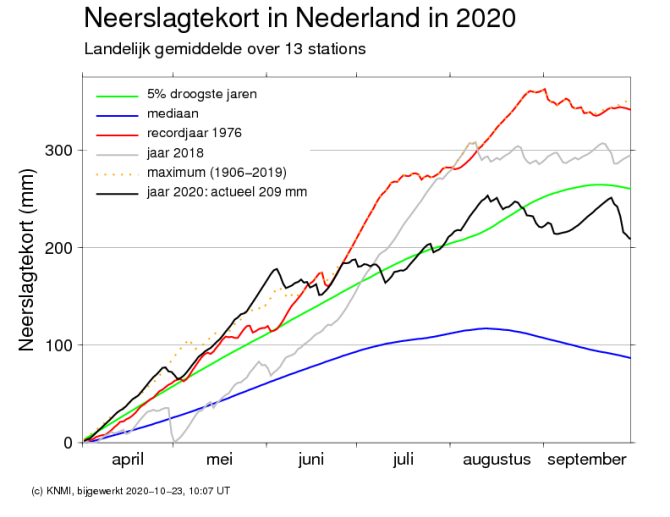
Project
Coping with Dutch droughts: Irrigation in the Netherlands
For the third year in a row, the Netherlands had a serious rainfall deficit during the summer and farmers needed to irrigate their crops. As agricultural water use is competing with other uses, irrigation bans were introduced to manage water scarcity. This is a rather ad hoc way to manage an apparently recurring problem.
Context
There exists therefore a need to study more strategic water management options to cope with limited water availability during periods with a rainfall deficit, such as i) improved water allocation among users, ii) improved groundwater level management, by keeping more water in the system and soil through less intensified drainage; and iii) improved more efficient irrigation technologies like subsurface drip irrigation.
The rainfall deficits experienced in the warmer periods of the last years, put the need to implement smart water-soil management practices and water management in the spotlight. The figure shows the rainfall deficit in the Netherlands of 2020.

Among other practices focused on keeping water in the soil, supplementary irrigation is seeing as a growing interest practice for farmers to guarantee crop production. Increased ground water abstraction and use of sprinkler irrigation as supplemental irrigation is taking place adding to further lowering of the groundwater table. The evaporation losses of sprinkler irrigation are high during summer. At the same time this situation creates an increased competition between agriculture, nature and society. An enormous sense of urgency has now arisen among water managers to study this subject and avoid the potential negative consequences of these techniques, application methods and current management practices.
Ambitions and objectives
As the Water Resources Management group of WUR and the Water and Food team of WenR both have a lot of experience in irrigation and water management worldwide, it is about time to tap on this expertise for improved water management in the Netherlands. This “seed” project aims to identify better the current WUR knowledge in smart water-soil management practices, either in the Netherland or abroad, in order to create a WUR network “copping with Dutch Droughts” and develop a clear research agenda on this topic to support the Dutch agri-sector.
This project will also serve to strength the research collaboration between WUR and Royal Eijkelkamp b.v. on the InnoFields innovation campus, through the setting-up of a field test facility where several irrigation technologies and smart water-soil management practices can be monitored, by using the state-of-the-art hardware and software.
Goal Investment Program ESG2020
- Review the current WUR expertise and tools available about potential smart soil-water management practices in the Netherlands, aiming to create a WUR knowledge network “copping with Dutch Droughts”. To do that, other Teams from WUR with potential expertise in the field, such as Soil and Land Water Management and Soil Water and Land use will be involved. In this stage, some internal workshops will be organized and the project team created, involving researchers from other teams, if needed. A research question to be investigated in more detail through field experiments will be formulated (goal 4).
- Research the strategic water management options looking at functions of water and at the stakeholders and prioritization of water use in times of drought. There are major competing interests at stake during periods of drought, which makes water allocation a ‘wicket problem’. It is therefore important to make trade-offs intrinsic to decision-making and priority setting explicit by means of stakeholder analysis, especially when it concerns societal needs such as drinking water for all, which are not revealed in the marketplace. It is also important that farmers know in advance how much water they can use for irrigation instead of facing random irrigation bans. The value of making trade-offs explicit lies not so much in its numerical assessment as in the process it offers to engage stakeholders across different perspectives and interests in water use as water allocation remains political in nature.
- Explore new agricultural use of the heterogeneous sandy-soil landscapes of eastern Netherlands. The bigger idea would be that groundwater levels in these areas need to be restored to mitigate impacts of droughts (climate adaptation). Such a transition would lead to a drastic re-design of land use, where water management aims at restoring groundwater levels, rather than optimal production. Agricultural (or other) land use should fit ‘natural’ circumstances rather than dictate water management needs.
- Setting-up of a field test facility in the InnoFields innovation campus to understand better how high technical sensorization could support smart soil-water management, through for example, actual soil water balance and experiment with alternative irrigation methods like sub surface drip irrigation and/or reverse drainage on certain crops (maize, potatoes, etc.).
- Within this (initiating) project a larger, multi-year, multi-participant, project will be formulated with funding of for example of the TKI Deltatechnologie.
Intended impact on longer term
The “Irrigation in the Netherlands” project will lay the foundations of a stronger involvement of WUR in drought management research and discussion in the Netherlands, looking to a broad set of smart water-soil management practices, such as supplementary irrigation, to be effectively implemented by Dutch farmers and water boards. This can only be done by looking from an interdisciplinary perspective, including technical, social and economic point of view.
The project will contribute to climate-robust agricultural production and water management systems in the Netherlands.
This project will also serve as a knowledge bridge between the private sector (Eijkelkamp), waterboard and WUR.